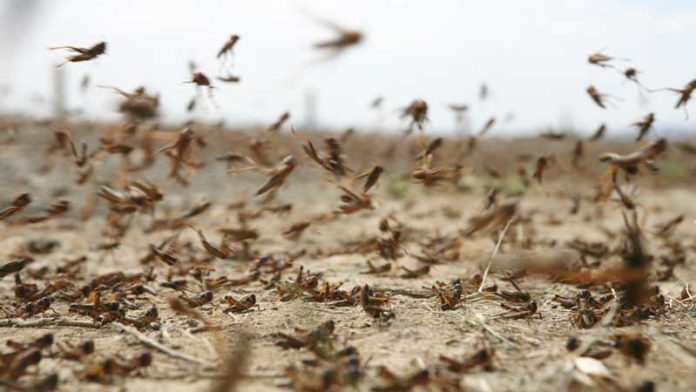Monitoring Desk
India has reached out to Pakistan to counter a locust invasion which threatens to destroy crops and undermine food security in south and southwest Asia — a region already facing the challenge of COVID-19 pandemic that has badly affected the farming.
According to Indian newspaper, Hindu, India had proposed a trilateral response in partnership with Pakistan and Iran to combat the desert locust wave sweeping across the Afro-Asian region.
“India has suggested to Pakistan that both countries coordinate locust control operations along the border, and that India can facilitate supply of Malathion, a pesticide, to Pakistan,” the newspaper quoted an Indian official as saying.
Desert locusts pose a major threat to food security in the region, including India. A typical locust swarm, which can vary from less than one square kilometre to several hundred square kilometres, can devastate farmlands. A one square kilometre swarm, containing about 40 million locusts, can in a day eat as much food as 35,000 people, assuming that each individual consumes 2.3 kg of food per day, says the Food and Agriculture Organisation (FAO). In India, small swarms of desert locusts, in the past weeks, have already arrived from Pakistan, moving east into Rajasthan, and reaching Jodhpur.
“We are preparing for a worst-case scenario. Starting from the Horn of Africa, and joined by desert locusts from breeding grounds en route, one locust stream can travel over a land corridor passing over Yemen, Bahrain, Kuwait, Qatar, Iran, Saudi Arabia, Pakistan and India, impacting farmlands in Indian Punjab, Haryana and the Indo-Gangetic plain. But another stream passing over the Indian Ocean can directly attack farms in peninsular India, and then head towards Bangladesh,” the official said.
India and Pakistan had a regular mechanism, led by their “Locust Officers,” who hold six annual border meetings, between June and November. This dialogue is held either at Munabao in Rajasthan or Khokhropar on the Pakistani side.
India is also offering to energise another mechanism marshalled by the Locust Warning Organisation, to coordinate a robust joint response by New Delhi, Islamabad and Tehran. So far, Iran has welcomed India’s offer of pesticide to control desert locusts in its arid South Khorasan province, and Sistan-Balochistan province that borders Pakistan, the Indian newspaper claimed.
However, Pakistan seems to be cautious before responding to Indian offer for joint action against the locusts.
According to English newspaper, Daily The News, the Indian proposal will be studied on various echelons before articulation of Pakistan’s position in this regard.
It is believed that Pakistan’s efforts to eliminate locust will benefit all neighbouring countries as it has already unleashed campaign for its eradication.















